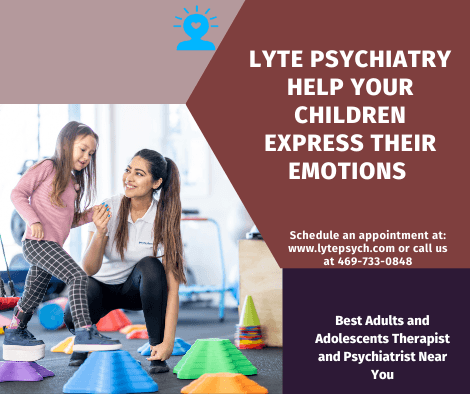Thu Aug 01 2024
Recognize How Play Therapy Can Help Your Children Express Their Emotions at Lyte Psychiatry (Top Psychiatrist and Therapist Near You) Best Adults and Adolescents Therapist and Psychiatrist, Dallas, TX

Recognize How Play Therapy Can Help Your Children Express Their Emotions at Lyte Psychiatry (Top Psychiatrist and Therapist Near You)
Children often face a myriad of emotional challenges that they might not yet have the tools to express or understand. Play therapy, a well-established psychological approach, provides a unique and effective means for children to express their emotions. This method leverages the natural way children learn and communicate – through play.
Understanding Play Therapy
Play therapy is a form of therapy that uses play to help children deal with psychological issues and trauma. It is particularly beneficial for children between the ages of 3 and 12. Through play, children can explore their feelings, express themselves, and make sense of their experiences.
The Benefits of Play Therapy
Understanding Emotions: Through guided play, children learn to understand their emotions and those of others. This understanding can lead to better emotional regulation and interpersonal relationships.
Improved Behavior: By addressing the root causes of emotional distress, play therapy can lead to improvements in behavior. Children who feel understood and supported are less likely to act out.
Enhanced Social Skills: Play therapy often involves interaction with the therapist and, in some cases, other children. This interaction can improve social skills and help children learn to communicate more effectively.
How Play Therapy Works
Play therapy typically involves several stages:
Assessment: The therapist observes the child at play to gain insights into their emotional state and issues.
Engagement: The therapist establishes a rapport with the child, creating a safe and trusting environment.
Therapeutic Play: The child engages in play activities designed to help them express and explore their emotions.
Reflection and Discussion: The therapist and child discuss the play activities, helping the child to make connections between their play and their emotions.
Call to Action & Seek Professional Help at Lyte Psychiatry (Best Adults and Adolescents Therapist and Psychiatrist Near You)
If you believe your child could benefit from play therapy, seeking professional help is a critical first step. At Lyte Psychiatry, we specialize in helping children and families understand their emotional and psychological challenges. Our experienced therapists use play therapy and other evidence-based approaches to support your child's emotional well-being.
To Scheduel an appointment. Click Here
To see our services. Click Here
Call us if you have questions at 469-733-0848
FAQs
Q: What types of issues can play therapy address?
A: Play therapy can help with a variety of issues, including anxiety, depression, ADHD, trauma, family conflicts, and social challenges.
Q: How long does play therapy take to be effective?
A: The duration of play therapy varies depending on the child's needs and issues. Some children may show improvement in a few sessions, while others may need longer-term therapy.
Q: Is play therapy only for young children?
A: While play therapy is most commonly used for children aged 3 to 12, it can also be adapted for older children and adolescents.
Q: How can parents support their child’s play therapy?
A: Parents can support their child's play therapy by providing a safe and supportive home environment, attending parent-therapist meetings, and being open to learning new parenting strategies.
Q: Can play therapy be used in conjunction with other treatments?
A: Yes, play therapy can be part of a comprehensive treatment plan that includes other therapies and interventions.